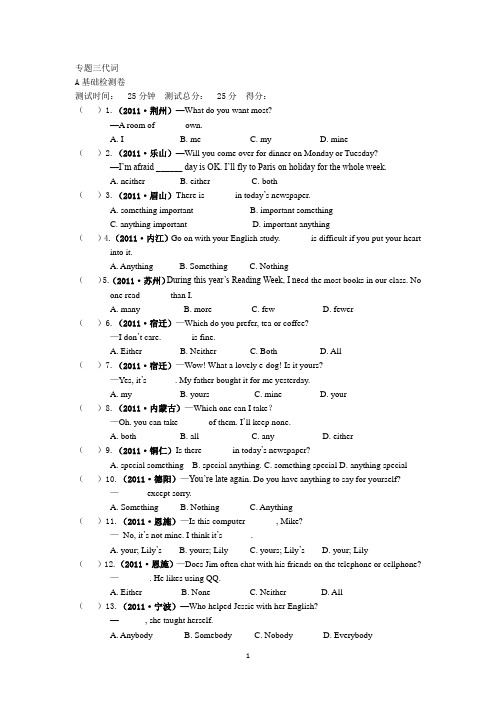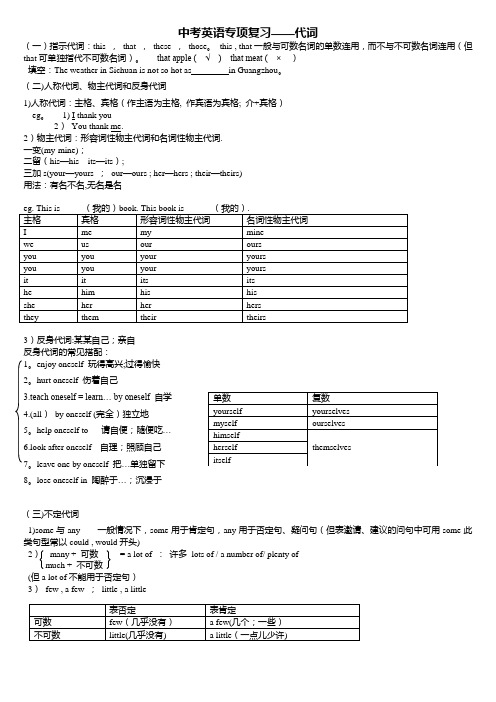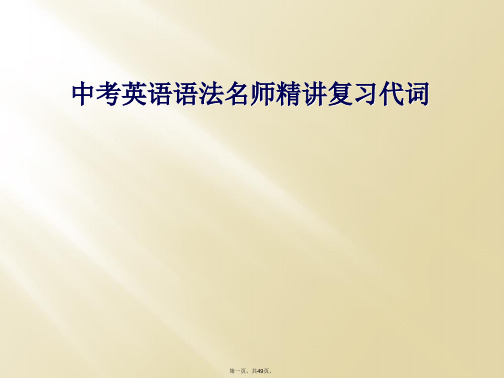2011届中考英语代词复习1
- 格式:ppt
- 大小:177.50 KB
- 文档页数:14


2011届中考英语专题复习一:名词考点讲解和训练【考点直击】1.可数名词和不可数名词的用法;2.名词所有格的构成及用法;3.近义名词的辨析。
【名师点睛】一、名词的数1.单数和复数可数名词有单数和复数两种形式。
复数形式通常是在单数形式后加词尾“-s”构成,其主要变法如下:(1)一般情况在词尾加-s,例如:book→books,girl→girls,boy→boys,pen→pens,doctor→doctors, boy→boys。
(2)以s,x,ch,sh,结尾的词加-es,例如:bus→buses,class→classes,box→boxes,watch→watches,brush→brushes。
(3)以ce, se, ze,(d)ge结尾的名词加s,例如:orange—oranges。
(4)以辅音母加y结尾的词变“y”为“i”再加-es,例如:city→cities, factory→factories, country→countries, family→families。
但要注意的是以元音字母加y结尾的名词的复数形式只加s,如:boy→boys, day→days。
(5)以o结尾的词多数都加-es。
例如:hero→heroes,potato→potatoes,tomato→tomatoes,但词末为两个元音字母的词只加-s。
例如:zoo→zoos,radio→radios,还有某些外来词也只加-s,例如:photo→photos,piano→pianos。
(6)以f或fe结尾的词,多数变f为v再加-es,例如:knife→knives,leaf→leaves, half→halves。
复数词尾s(或es)的读音方法如下表所示。
复数词尾s(或es)的读音方法[s][z][t][][F][b][d][(7)少数名词有不规则的复数形式,例如:man→men,woman→women,tooth→teeth,foot→feet,child→children,mouse→mice。

专题三代词A基础检测卷测试时间: 25分钟测试总分: 25分得分:()1.(2011·荆州)—What do you want most?—A room of ______ own.A. IB. meC. myD. mine()2.(2011·乐山)—Will you come over for dinner on Monday or Tuesday?—I’m afraid ______ day is OK. I’ll fly to Paris on holiday for the whole week.A. neitherB. eitherC. both()3.(2011·眉山)There is ______ in today’s newspaper.A. something importantB. important somethingC. anything importantD. important anything()4.(2011·内江)Go on with your English study. ______ is difficult if you put your heart into it.A. AnythingB. SomethingC. Nothing()5.(2011·苏州)During this year’s Reading Week, I ne ed the most books in our class. No one read ______ than I.A. manyB. moreC. fewD. fewer()6.(2011·宿迁)—Which do you prefer, tea or coffee?—I don’t care. ______ is fine.A. EitherB. NeitherC. BothD. All()7.(2011·宿迁)—Wow! What a lovely e-dog! Is it yours?—Yes, it’s ______. My father bought it for me yesterday.A. myB. yoursC. mineD. your()8.(2011·内蒙古)—Which one can I take?—Oh. you can take ______ of them. I’ll keep none.A. bothB. allC. anyD. either()9.(2011·铜仁)Is there ______ in today’s newspaper?A. special somethingB. special anything.C. something specialD. anything special ()10.(2011·德阳)—You’re late aga in. Do you have anything to say for yourself?—______ except sorry.A. SomethingB. NothingC. Anything()11.(2011·恩施)—Is this computer ______ , Mike?—No, it’s not mine. I think it’s ______.A. your; Lily’sB. yours; LilyC. yours; Lily’sD. your; Lily()12.(2011·恩施)—Does Jim often chat with his friends on the telephone or cellphone?—______. He likes using QQ.A. EitherB. NoneC. NeitherD. All()13.(2011·宁波)—Who helped Jessie with her English?—______, she taught herself.A. AnybodyB. SomebodyC. NobodyD. Everybody()14.(2011·湖州)—I could look after ____ when I was five.—Really? I can’t believe it.A. myselfB. herselfC. himselfD. yourself()15.(2011·苏州)-Can I use your bike this afternoon?______ is under repair.-No problem. Here’s the key.A. MyB. MineC. MeD. Me()16.(2011·三亚)—It was a heavy snow last night. Are we all here now?—Yes, and ______ of us was late for school.A. allB. eitherC. neitherD. none()17.(2011·桂林)This is ______ MP4. Yours is over there.A. myB. meC. ID. mine()18.(2011·肇庆)My uncle is not rich, but he has many books in ______ room.A. heB. hisC. him()19.(2011·泉州)This is my sweater. Where’s ______?A. youB. yoursC. yourD. yourself()20.(2011·重庆)______ may have a chance to be successful if he tries his best.A. SomebodyB. EverybodyC. NobodyD. None()21.(2011·北京)I knocked on the door but ______ answered.A. somebodyB. nobodyC. anybodyD. everybody()22.(2011·衢州)______ is difficult if you put your heart into it.A. SomethingB. EverythingC. AnythingD. Nothing()23.(2011·青岛)Harry Potter is so interesting a book that lots of teenagers like to read ______A. itB. thisC. thatD. one()24.(2011·河南)—Will you take part in the English speech competition tomorrow?—Sure. I see as a chance to prove ______.A. myselfB. meC. yourselfD. you()25.(2011·深圳)You’d better use ______ computer. ______ is broken.A. his;MyB. his;MineC. he;MyD. him;MineB能力达标卷测试时间: 25分钟测试总分: 25分得分:()1.(2011·深圳)—I have money with me. Would you mind lending me some?—Of course notA. a fewB. a littleC. fewD. little()2.(2011·北京)I’m talking to you,Jack. Please listen to ______ carefully.A. meB. mineC. youD. yours()3.(2011·衢州)—Tomorrow is David’s tenth birthday.—Yes. Let’s give ______ a CD. He likes musicA. himselfB. hisC. himD. he()4.(2011·鸡西)Welcome to my new house, Ann and John! Help ______ to some fruit.A. myselfB. yourselfC. yourselves()5.(2011·南京)—What’s wrong with my son, doctor?—______ serious. Just a slight cold.A. SomethingB. AnythingC. NothingD. Everything()6.(2011·安徽)—I’m hungry, ls there any bread in the fridge?—______but we have cakes. Would you like to have one?A. SomeB. MuchC. NoneD. Nothing()7.(2011·枣庄)Did you see Peter and Mike? No, I saw ______of them.A. neitherB. eitherC. bothD. none()8.(2011·重庆)Please send ______ best wishes to Mary.A. IB. meC. myD. mine()9.(2011·泉州)Give the girls two bananas ______ .A. allB. eachC. bothD. every()10.(2011·济宁)—Is this your key, Jenny ?—No, ______ is in my handbag.A. HisB. HersC. MineD. Yours()11.(2011·济宁)Most students think they should have ______ time and energy to develop their own interests.A. fewB. lessC. littleD. more()12.(2011·菏泽)______ of the two story books are very interesting, so I can’t decide which one to choose.A. AllB. AnyC. EitherD. Both()13.(2011·菏泽)______ you do, don’t miss this exhibition, for it’s so hard for me to get the tickets.A. WhateverB. HoweverC. WheneverD. Whether()14.(2011·宿迁)We have two foreign teachers here. One is from England, and ______ is from America.A. anotherB. the otherC. otherD. the others()15.(2011·恩施)We didn’t learn ______ in this lesson.A. something newB. new somethingC. anything newD. new anything()16.(2011·烟台)—Do you know ______ this dictionary belongs to?—Let me see. Oh, it’s ______.A. who does, mineB. who, meC. whose, mineD. who, mine()17.(2011·烟台)—Do you have enough students to clean the laboratory?—No, I think we need ______ students.A. anotherB. two othersC. more twoD. two more()18.(2011·烟台)A foreign visitor is coming to visit our new house this evening. My mother will offer him ______ to eat.A. anything deliciousB. something real ChineseC. something Japanese foodD. delicious something()19.(2011·泰安)—Excuse me, are these ______ new shoes?—No, they aren’t. ______ are black over there.A. your; MineB. my; YourC. her; HerD. mine; Yours()20.(2011·泰安)—I prefer speaking to listening in English learning.—Oh, really! I think you should be good at ______ of them.A. bothB. neitherC. someD. all()21.(2011·杭州)A smile costs nothing, but gives so ______.A. littleB. fewC. manyD. much()22.(2011·晋江)—Which do you prefer, tea or coffee?—______ is OK.I don’t care.A. EitherB. NeitherC. Both()23.(2011·晋江)—Who teaches ______ English?—No one. I teach ______.A. you; myselfB. your; myselfC. you; me()24.(2011·南京)Mrs Liu teaches ______ English. We like ______ class very much.A. me; hisB. me; herC. us; thisD. us; her()25.(2011·南京)I don’t like the colour of the T-shirt. Would you show me ______ one?A. otherB. the otherC. anotherD. others代词基础检测卷答案1.【答案】 C2.【答案】A3.【答案】A4.【答案】C5.【答案】B6.【答案】A7.【答案】C8.【答案】B9.【答案】D 10.【答案】B 11.【答案】C 12.【答案】C 13.【答案】C 14.【答案】A 15.【答案】B 16.【答案】D 17.【答案】A 18.【答案】B 19.【答案】B 20.【答案】B 21.【答案】B22.【答案】D23.【答案】A【解析】考查代词的用法。

中考英语专项复习——代词(一)指示代词:this , that , these , those 。
this , that 一般与可数名词的单数连用,而不与不可数名词连用(但that 可单独指代不可数名词)。
that apple ( √ ) that meat ( × )填空:The weather in Sichuan is not so hot as __ in Guangzhou 。
(二)人称代词、物主代词和反身代词1)人称代词:主格、宾格(作主语为主格, 作宾语为宾格; 介+宾格)eg 。
1) I thank you2) You thank me.2)物主代词:形容词性物主代词和名词性物主代词.一变(my-mine);二留(his —his its —its );三加s(your —yours ; our —ours ; her —hers ; their —theirs)用法:有名不名,无名是名3)反身代词:某某自己;亲自反身代词的常见搭配:1。
enjoy oneself 玩得高兴;过得愉快2。
hurt oneself 伤着自己3.teach oneself = learn… by oneself 自学4.(all ) by oneself (完全)独立地5。
help oneself to 请自便;随便吃…6.look after oneself 自理;照顾自己7。
leave one by oneself 把…单独留下8。
lose oneself in 陶醉于…;沉浸于(三)不定代词1)some与any一般情况下,some 用于肯定句,any 用于否定句、疑问句(但表邀请、建议的问句中可用some-此类句型常以could , would 开头)2) many + 可数 = a lot of : 许多 lots of / a number of/ plenty ofmuch + 不可数(但a lot of 不能用于否定句)3) few , a few ; little , a little①。


代词(1)人称代词的用法人称代词、物主代词和反身代词的基本结构人称代词在句于中作主语时用主格,作动词或介词的宾语时用宾格。
例如:应谈说between you and me,而不是between you and I。
● 人称代词在句子中作表语时,口语中常用宾格来代替主格。
例如:一Who's that?一-It's me.● 如果主语是并列的几个人,要将人称代词you放在最前面,I 放在最后面。
例如:You, he and I are all from Bejing.● it可用来指动物、无生命的东西或者指上文已提到的或下文将要提到的事物,也可以指自然现象、时间、距离、温度等。
例如:The horse is a useful animal. I like it very much. It's rather cold today, isn't it?[注]“it” 还是可用作引导词, 在句中作形式主语或形式宾语,代替由不定式或从句等所表示的真正主语或宾语。
例如:It is not easy to learn English well.(it 在句中作形式主语)it”可用在强调结构中,强调句子的某一成分。
● 形容词性物主代词只能用作定语,修饰名词:名词性物主代词相当于名词,在句子中可作主语、宾语和表语。
例如: This pen is hers,mine is in my office. Can I use yours?● 反身代词不能单独用作主语,也不能用作定语,但可以用来强调名词或代词,作名词或代词的同位语,有“亲自”的意思。
例如:I always have to do everything myself.● 反身代词可用作动词或介词的宾语。
当主语和宾语指的是同一人和物时,宾语应用反身代词而不用宾格人称代词。
例如:Her brother is too young to look after himself.(2)指示代词指示代词有this, these that, those, such和same它们通常在句子中充当主语、宾语、表语和定语。
必备英语中考英语代词的用法归纳练习一、初中英语代词1.Be patient, John. Don't give up. Have___________ try.A. otherB. anotherC. the otherD. one【答案】 B【解析】【分析】句意:约翰,要耐心。
别放弃。
再试一次。
A.其他的;B.另一次,又一次;C.另一个,其他的;D.一。
根据Don't give up.可知,劝对方不要放弃,所以要求他再试一次,应使用another。
故选B。
【点评】考查代词辨析,注意不定代词another的用法。
2.Our Chinese teacher likes to play football with _______________ after school.A. weB. ourC. usD. ours【答案】 C【解析】【分析】句意:我们的语文老师放学后喜欢和我们一起踢足球。
A 我们,人称代词主格;B 我们的,形容词性物主代词;C 我们,人称代词宾格;D 我们的,名词性物主代词。
play football with sb,与某人一起踢足球;当sb是人称代词时,要用宾格形式,故选C。
【点评】考查人称代词与物主代词的辨析。
注意介词后面跟人称代词时要用宾格形式。
3.— Can you call on my mother on Saturday or on Sunday?— I'm afraid _______________ day is possible.A. eitherB. eachC. bothD. neither【答案】 D【解析】【分析】句意:——在周六或周日你能去拜访我母亲吗?——我恐怕两天都不行。
根据I'm afraid我恐怕,可知是表示否定,且是否定两天,neither两者都不,否定两者,故选D。
【点评】考查代词辨析,识记neither的用法。
中考常见代词100个短语1.all of us我们所有人2.some of them他们中的一些3.one of you你们中的一个4.a few of the boys 男孩中的几个5.few of them他们中很少有人6.neither she norther she 她和我都不7.either you or she要么你要么她8.all my friends 我所有的朋友们9.all the students所有的学生10.a few pairs几双11.of the three friends在三个朋友当中12.the others 其余的人/物13.something important重要的事情/东西14.other subjects其它的科目15.talk to each other 彼此交谈16.any other girls其它任何一个女孩17.either of them两个中的任何一个18.both of them他们中的两个19.many of them他们中的许多20.each of them他们中的每一个21.all of them他们中的全部22.any of them 他们中的一些/任一23.none of them他们中没有人24.neither of them他们两个都不25.another one另外一个26two more apples另外两个苹果27just a little. 仅仅一点28hust a few. 只有几个29another twenty dollars, 另外20美元30another two apples.另外两个苹果31.anything new任何新的东西32.a few more再多几个33.much too太34.too much太多35.so many如此多36.so few如此少37.so little如此少38.so much如此多39.little time几乎没有时间40.a little water一些水41.many friends许多朋友42.another boy另一个男孩43.a little more再多一些/点44.each side of the road路的每一边45.either side of the road路的两边46.both sides of the road路的两边47.know a little知道一些48.know much懂得很多49.some chicken一些鸡肉50.eight of us我们中的八个51.another bottle of water另一瓶水52.a lot of water许多水53.a lot of boys许多男孩54.lots of books许多书55.know a lot懂得很多56.something else别的一些东西57.what else其它什么东西60.58.nothing wrong没有错误61.59.every boy每个男孩62.60.a red one一个红色的61.the green ones那些绿色的62.by themselves全靠他们自己63.help yourself随便吃/喝64.enjoy herself玩的快乐65.any money一些钱66.any books一些书67.both boys两个男孩68.no more不再69.no longer不再70.not …at all一点也不71.not …any longer不再72.not.…any more不再73.they both他们两个74.we all我们全部/我们所有75.both Tom and Jack汤姆和杰克两人都76.no brothers or sisters没有兄弟和姐妹77.none of the books这些书中没一本78.quite a few相当多79.quite a few people相当多的人80.have little time几乎没有时间81.few people几乎没有人82.some day某天83.some time某个时间84.think of others关心/考虑别人85.two of the ten boys10个男孩中的两个86.learn from each other向别人学习87.help each other相互帮助88.each other彼此89.someone strange奇怪的人90.which one哪一个91.no one没有一个人/东西92.not everyone of us不是我们中的所有人93.the one on the desk桌子上的那个94.a few cakes一些蛋糕95.a little bread一些面包96.some water in the bottle瓶中的一些水97.some birds in the tree树上的几只鸟98.many too太99.too many太多的…100.in all总共。